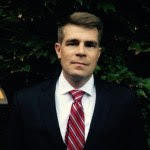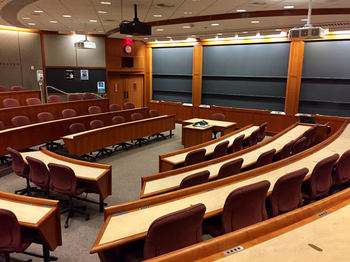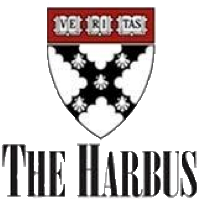
By Aaron Kinsey, Harvard Business School, Class of '17 & Harbus Contributing Writer
The mood on the Harvard Business School campus last week was incredibly somber. The entire institution appeared to be paralyzed. Undoubtedly, some of this was driven by the fear and uncertainty around what a Trump administration will look like. A substantial portion of the underlying despair was, and still is, driven by disbelief. Disbelief that a race which was presumably "in the bag" was turned on its head by a candidate that almost every news outlet had written off. Personally, I knew many were not expecting this outcome, but I was shocked at the extent of the surprise that Donald Trump would be our next president.
Two of my Tuesday classes - one at HBS and one at HKS - asked students for election predictions. I twice predicted a Trump victory, and each time, I received looks that implied I couldn't possibly be serious. Many of my classmates could not fathom the American public voting Donald Trump in as our next President. In their minds (and per the HBS student election poll published in the Harbus), Hillary would run away with a landslide victory. It was then no surprise that there was absolutely no curiosity around why I could have arrived at such an opinion.
So how could a man, down in almost every major poll and written off by a media eager to see him fail, pull off one of the biggest upsets in electoral history? More importantly, how could the pollsters have gotten this so wrong? One can argue that a major contributor to the deviation in predictions was because Trump supporters did not feel comfortable opening up to pollsters. In fact, according to Frank Luntz, a renowned pollster, and CEO of Luntz Global, many people who supported Trump declined to even answer the exit polls, thus further contributing to the skew.
This topic brings up a few pertinent questions for us to consider:
Why would some of Trump's supporters refuse to talk to the pollsters?
Over the past few years, our country has embraced a culture of political correctness. Viewpoints against progressive thought are swiftly attacked, oftentimes with an "ist" or "ism" labeling attached. These attacks have severely undermined the ability and willingness of those with opposing views to openly discuss their differences. Once a label has been inserted, the conversation takes on a different theme in which one must defend their character instead of debate the political issue at hand. Thus, they never get the opportunity to present and defend their stance. In fact, it causes those who were threatened to check out of future discourse! If their opinion is not even allowed a seat at the table, there is no purpose in voicing it. The result is that even in a society which claims to embrace discourse and differing views, people do not feel free to share their true perspectives. It's simply not a battle in which most people want to engage. For them, the risk is just too high that someone will use a false narrative or unconscious bias to punish them socially. This is precisely why some Trump voters declined participation in exit polling.
Does a similar phenomenon play out at HBS?
In our own community at HBS, the decision on whether to fully engage is one that conservatives face every day. I know this to be true because it has been my experience over the last year and a half. I came to HBS with an open mind for the opportunity and genuinely wanted to enhance my ability to see things from the perspective of a diverse group of people whose backgrounds were much different than mine. I spent my first semester somewhat guarded in expressing my opinions and beliefs or challenging those with whom I disagreed. The social risks seemed very high. After Christmas break, I decided I could not do it anymore.  I would be more outspoken and portray a contrarian argument. I simply could no longer allow myself to be suppressed. Once I started to openly express my views, I noticed a series of "strange" occurrences happening at school. Several of my classmates would either text me or discretely approach me in the hallway to tell me that they agreed with my opinions. Honestly, I had no idea that they shared the same opinions on many issues. You see, those with differing beliefs were afraid to speak out in class, out of fear of social retribution, even though their beliefs would have represented a voice frequently unheard by HBS students. Even worse, many of these same people continue to remain silent about their beliefs to this day. Perhaps if dialogue around these beliefs would have been previously welcomed at HBS, the community would have been much less surprised by Trump's victory This begs us to ask the question, is this the open and inclusive community for which we strive at Harvard?
I would be more outspoken and portray a contrarian argument. I simply could no longer allow myself to be suppressed. Once I started to openly express my views, I noticed a series of "strange" occurrences happening at school. Several of my classmates would either text me or discretely approach me in the hallway to tell me that they agreed with my opinions. Honestly, I had no idea that they shared the same opinions on many issues. You see, those with differing beliefs were afraid to speak out in class, out of fear of social retribution, even though their beliefs would have represented a voice frequently unheard by HBS students. Even worse, many of these same people continue to remain silent about their beliefs to this day. Perhaps if dialogue around these beliefs would have been previously welcomed at HBS, the community would have been much less surprised by Trump's victory This begs us to ask the question, is this the open and inclusive community for which we strive at Harvard?
What can we all learn from this that can help us in our HBS studies and in our careers after graduation?
In many ways, this controversial time can serve as a great opportunity for self-reflection and improvement. First, on an individual level, we should strive to hear the viewpoints of others, withhold judgment, and consider the views based on their merits. It sounds easy, but it's extremely hard. I know because I've spent the past year building this skill within myself. It doesn't require us to change our own views, but teaches us to withhold labels and resist inserting them into debates in lieu of logic and proven facts. Making these adjustments can help us become better-informed members of a community in which we strive toward better ideas and solutions to the challenges of our societies.
Additionally, as future business leaders, we should pause to appreciate the value in creating culture. The current cultural climate made many voters reluctant to speak up about what they truly believed. In our future businesses, can we afford the cost of not receiving legitimate and accurate feedback from those in our organizations? What are those costs and who are the stakeholders who must bear them? Our challenge is to create an environment where ALL views are justly considered, not just the loudest or most persistent.
Finally, to fellow conservatives in the HBS student body, your classmates need you to share your experiences and opinions. The first time you stand up for your beliefs in class is the hardest, but at least you can sleep at night knowing you've been true to yourself. You might even be the one that spurs the discussion forward and helps our institution in its mission to educate leaders who make a difference in the world. By speaking up, you do yourself and your fellow classmates a service. To hear open, honest debate is a rarity today; let's make sure we start by fostering it here.
-----------------------------------------
Aaron Kinsey (HBS '17) is an EC student from Section D who prides himself on his Texas roots. Prior to HBS, he spent 9 years as a U.S. Air Force pilot and worked for Deloitte and the San Antonio Area Foundation. He spent the past summer at MetLife Real Estate Investors. Aaron is a Senator, Co-President of the Republican Club, Co-President of the Free Enterprise Club, and CFO of the Armed Forces Alumni Association.

